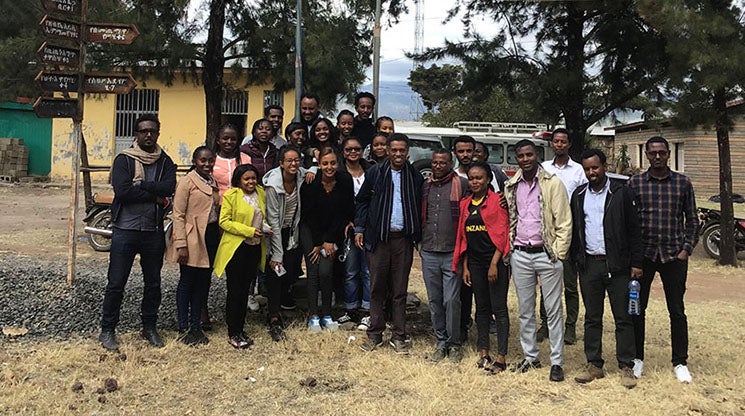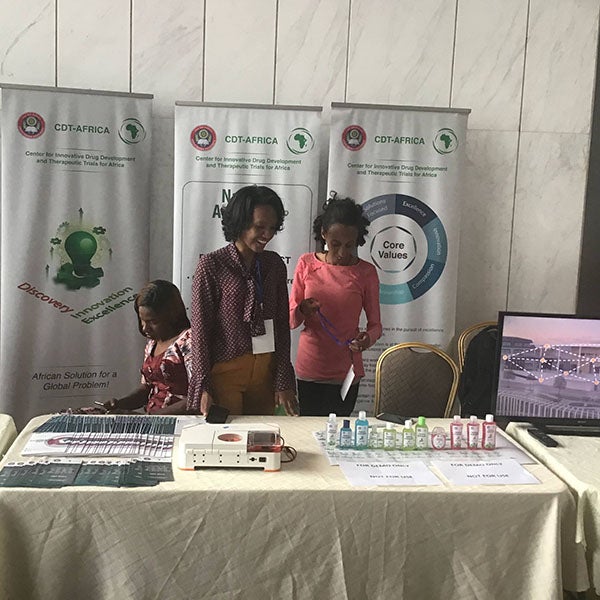 CDT-Africa at the Africa Innovation Week with some products in display at the African Union (Oct/Nov 2019) . Copyright: World Bank Group
CDT-Africa at the Africa Innovation Week with some products in display at the African Union (Oct/Nov 2019) . Copyright: World Bank Group
Since the news of Ethiopia’s first case of coronavirus (COVID-19) on March 13, various measures have been taken to counter its spread, including the declaration of a national state of emergency on April 8. The country has banned public gatherings of more than four people until September, and stringent public health measures aimed at curtailing the spread of the virus were also introduced. A regulation is in effect that makes wearing coverings over the nose and mouth compulsory while in public, and transport operators are restricted to 50 percent capacity. Despite the strict measures taken relatively early, by June 4 there were 1636 confirmed cases with eighteen fatalities reported; the country had conducted 125,570 tests.

The Centre for Innovative Drug Development and Therapeutic Trials for Africa (CDT-Africa) got heavily involved in COVID-19 response early on, in Ethiopia and across Africa. CDT-Africa is a World Bank–supported center for teaching and research that is based in Ethiopia under the regional Eastern and Southern Africa Center of Excellence Project (ACE-II). It joined the global COVID-19 clinical research coalition (https://covid19crc.org/), an association of 70 institutions from 30 countries that aims to “fast-track research that will provide evidence on COVID-19 prevention, diagnosis, and case management in resource-limited settings.” CDT-Africa has also established an Advisory Committee on Clinical Trials (ACT), which works to strengthen and streamline ethics and regulatory processes nationally. The committee is now supporting guideline development and coordination of clinical trials to address the COVID-19 pandemic.
Countries across the globe have had to introduce measures to curb the spread of false news related to the pandemic. CDT-Africa is serving an increasingly important role in fighting the spread of misinformation across Ethiopia and the region. The problem is exacerbated by social media, with false information spreading like wildfire, even prompting the WHO Director-General Dr. Tedros Adhanom Ghebreyesus, to acknowledge that “false news spreads faster and more easily than the virus.” Ensuring widespread access to accurate information from official sources as well as improving transparency helps combat false information about the virus, which is imperative for maintaining social commitment to curb its spread.

The center has established a knowledge synthesis team that aims to provide timely, reliable information on COVID-19 to officials and the public. Its coordinator, Dr. Abebaw Fekadu, says that, “every morning a team of CDT-Africa scientists holds a Zoom meeting to discuss the latest developments. The information garnered from prominent official sources is curated, analyzed and synthesized, and a daily update is produced and sent to the Ethiopian Ministry of Health to help with producing reliable official information on COVID-19 and develop treatment guidelines.” These daily updates are posted on CDT-Africa’s website and social media channels to ensure availability to the wider public.
To contribute to Ethiopia’s fight against the pandemic, CDT-Africa is also involved in the production of a natural antiseptic and the development of personal protection equipment (PPE). And with a focus on future recovery and resilience, CDT-Africa is involved in developing and implementing clinical trials and clinical research relevant to the control of COVID-19. The center is conducting systematic reviews to investigate the potential for use of traditional herbal medicines in the fight against COVID-19 and supporting ethics guideline development for emergency use of traditional herbal medicines.
All these interventions by the center demonstrate that creating capacity in higher education, particularly in the fields of science and technology, is crucial for developing countries to addresses the challenges posed by emergency situations.


Join the Conversation